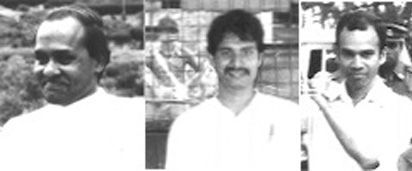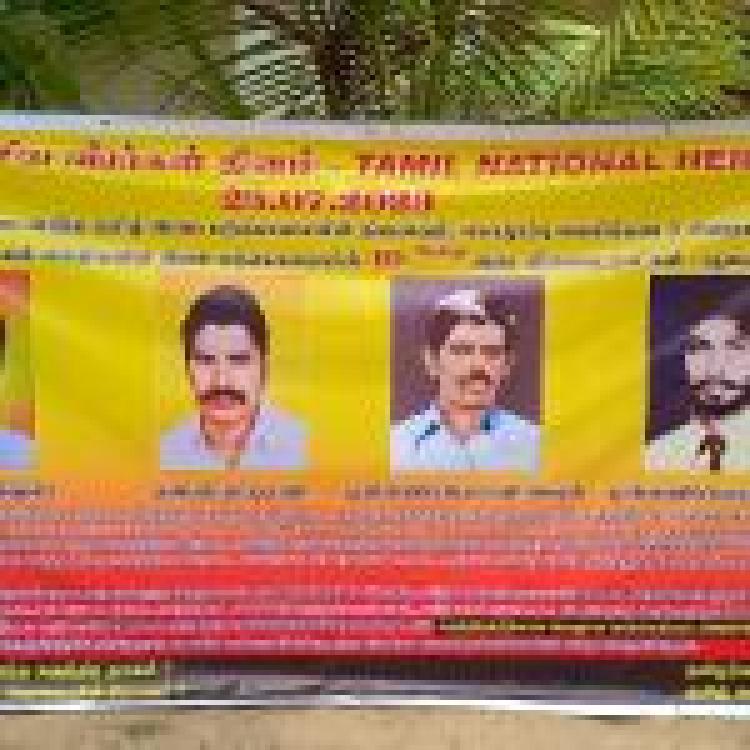Several events were held across the North-East this week to mark 41 years since the Welikada massacre, in which 53 Tamil political prisoners were murdered by Sinhala inmates and prison guards.
The massacre took place during the Black July pogrom of 1983.
Mannar
The head of the Tamil Eelam Liberation Movement (TELO) Selvam Adaikalanathan while attending a memorial for the Tamils who were massacred in the Welikada massacre said that there elements in the South of Sri Lanka who were planning and staging events aimed at erasing the history of Eelam Tamils
“We should not lose our people and our land due to our lack of unity,” he said speaking at an event held in Mannar to mark a commemoration of the Welikada Massacre. The event was held at the TELO office where several Tamils gathered to pay their respects and honor them. “Even though TELO lost its members who propelled the movement, we are now working with five other parties so that we can remain united for the cause of the Tamil aspiration.”
He appealed for all members and Tamil political parties to unite so they can avert the ethnic cleansing and the ruination of the Tamil homeland by forces from Sri Lanka’s South.
Jaffna
A memorial was held at the Father Chelva Hall in Jaffna this week to commemorate the 41st annivesary of the massacre.
The event was organized by the Democratic Tamil National Alliance to remember the lives of 53 Tamil prisoners who were massacared within the Welikada jail. Relatives of those who were killed led the memorial lighting candles and laying floral wreaths. Several members of the DTNA including Dharmalingam Siddarthan, Suresh Premachandran and N. Srikanth were present during the event.
.jpg)
.jpg)
.jpg)
.jpg)
Vavuniya
A similar trubute was held in Vavuniya. At the event, Nadarajah Thangavelu, alias Thangathurai, the co-founding leaders of TLO (Tamil Liberation Organisation) was honored along with Commander Guttimani and combatant Jagan. The event was led by Vavuniya district organizer of TELO, while several members took part in the event.
.jpg)
Colombo
Marking the commemoration, Tamil National People's Front (TNPF) MP Selvarajah Kajendran met with Tamil political prisoners who are still behind bars at the Welikada Prison in Colombo.
Speaking to reporters he said that these prisoners have been behind bars for over 29 years. "It has been 41 years since the Welikada Massacre, which took place at this very prison. Today we came to prisoners who are yearning to be released and we call on the government to secure their release. They have called on Tamils at home and around the world to help secure their release."
வெலிக்கடைச்சிறை படுகொலையின் 41 வருடம்.
— Selvarajah Kajendren MP (@skajendren) July 23, 2024
இன்று மகசீன் சிறைச்சாலைக்குச் சென்று தமிழ் அரசியல் கைதிகள் சிலரைச் சந்தித்தோம்.
15 - 29 வருடங்களாக சிறையில் அணுவணுவாகச் செத்துக்கொண்டிருக்கிறார்கள்.
11 கைதிகளதும் விடுதலைக்காக தமிழ் மக்கள் தீவிரமாக குரல் கொடுக்க வேண்டும். pic.twitter.com/EbcXv7hgig
The massacre

Tamil political prisoners: Dr S Rajasunderam, Selvarajah Yogandram and Nadarajah Thangathurai
On the 25th July 1983 Sellarasa “Kuttimani” Yogachandiran, leader of the Tamil Eelam Liberation Organisation (TELO) and Ganeshanathan Jeganathan, a political writer, had their eyes gouged out in mockery before being killed by Sinhalese inmates at the high security Welikada prison in Colombo.
A total of 37 Tamil prisoners were murdered the same day, and 18 more were killed two days later.
In 1976, Kuttimani’s name appeared on the list of 47 Tamil prisoners held without trial under Emergency Regulations. Martin Ennals of Amnesty International had constructed the Report of Amnesty International Mission (Jan 1975), indicating that Kuttimani was a “prisoner whose case is under investigation by Amnesty International”. The report further discloses that Kuttimani was kept in Welikada and was arrested in August 1975. He was released in 1977.
On March 21st, 1981, Neervely’s Bank robbery of 8 million Sri Lankan rupees led the Sri Lankan police officials to accuse Kuttimani as the orchestrator. He was arrested on April 5, 1981, along with Thangathurai and Selvadurai Sivasubramaniam alias, Devan, while bidding to escape in a boat to Tamil Nadu. The following year, in August, Kuttimani and Jegan were served a death sentence by the Colombo High Court, under the Prevention of Terrorism Act (PTA).
Ganeshanathan Jeganathan, nicknamed Jegan was a political writer and an early member of TELO. He hailed from Thondaimanaru. The abrupt death of TULF’s Vaddukoddai MP T. Thirunavukkarasu in 1982, allowed an open seat for Kuttimani. The then-leader of TULF, A. Amirthalingam informed the Elections Commissioner of his decision to nominate Kuttimani as the new MP of Vaddukoddai. But then Prisons Commissioner Priya Delgoda announced on 16 October 1982 that Kuttimani would not be released from prison to take his oaths at the parliament, legally disqualifying him from membership.
On November 2nd, 1981, the trials of Kuttimani, Thangathurai, and Devan began under the Sri Lanka Prevention of Terrorism Act. The outcome of the trial was a death sentence. Famously, Kuttimani stated:
“I request that I should be hanged in Tamil Eelam… I request that my eyes be donated to some blind person so that Kuttimani will be able to see through those eyes the reality of Tamil Eelam”.
Whilst their trials were still pending, Kuttimani and Thangathurai were brutally murdered in Welikada Maximum Security Prison.
Kuttimani’s tormentors “gouged out” his eyes - an allusion to the request that he had made. According to Amnesty International, the Sinhala prisoners were offered alcohol and permitted to attack the Tamil prisoners.
See an extract from The Guardian, on 5th August 1983, below:
'It is the massacres in the Welikade gaol which are attracting the most attention. There is a particular interest in circumstances in which two alleged guerrilla leaders were killed.
The two men, Sellarasa “Kuttimani” Yogachandiran, leader of the Tamil Eelam Liberation Organization (TELO) and a political writer, and Ganeshanathan Jeganathan had been sentenced to death last year for the murder of a policeman.
In speeches from the dock, the two men had announced that they would donate their eyes in the hope that they would be grafted on to Tamils who would see the birth of Eelam, the independent state they were fighting for.
Second hand reports from Batticaloa gaol, where the survivors of the Welikada massacre are now being kept, say that the two men were forced to kneel and their eyes gouged out with iron bars before they were killed.
One version has it that Kuttimani’s tongue was cut out by an attacker who drank the blood and cried: “I have drunk the blood of a Tiger.”
The two men were among the 35 Tamils killed in the Welikada gaol on July 25. Another 17 were killed in the gaol two days later and the Guardian has obtained a first hand account of part of the fighting in this incident, including the circumstances in which Sri Lanka’s Gandhian leader, Dr. Rajasunderam, died.
Dr. Rajasunderam was one of nine men, including two Catholic priests and a Methodist minister, who were moved out of their cells immediately after the July 25 killings—to make way for survivors moved into their cells on security grounds—into a padlocked hall, upstairs in the same block.
The nine, convinced that further attacks were coming, made repeated representations to the prison authorities on July 26 for better security measures. Assurances were given that they would be protected, but nothing was done.
At 2:30 pm in July 27, hearing screaming and whistling outside, one of the priests looked out of a high window and saw prisoners breaking in from a neighboring compound, wielding axes, iron bars, pieces of firewood, and sticks. There was no sign of the prison guards.
The mob, which was later found to have killed 16 prisoners in the downstairs cells, ran up to the hall and began breaking the padlock. Dr. Rajasunderam then went to the door and cried out: “Why are you trying to kill us? What have we done to you?” At that moment, the door burst open and Dr. Rajasunderam was hit on the side of the neck by a length of iron. Blood was seen to spurt several feet.
“At that juncture, we thought we should defend ourselves,” one of the prisoners related. “We broke the two tables in the hall and took the legs to defend ourselves.” “We kept them at bay. They threw bricks at us. We threw them back. Pieces of firewood and an iron bar were thrown at us. We used them to defend ourselves. It went on for about half an hour. They shouted: ‘You are the priests, we must kill you.’”
The killing was eventually ended by the army, who moved in with teargas. An inquest has been opened into the Welikada massacres, but the above details did not emerge. Prison warders claim that keys to the cells were stolen from them.
Lawyers for the prisoners who have accused the warders of having participated, claim that they were not given the opportunity to bring evidence despite representation to the Government.'
The International Commission of Jurists commented:
"It is not clear how it was possible for the killings to take place without the connivance of prison officials, and how the assassinations could have been repeated after an interval of two days, since Welikade prison is a high security prison and the Tamil prisoners were kept in separate cells..."
Along with Kuttimani and Thangathurai, the Tamil prisoners who were massacred in Welikada on 25th July 1983 were:
Nadesathasan, Jegan, Alias Sivarasa, Sivan Anpalagan, A. Balasubramaniam, Surash Kumar, Arunthavarajah, Thanapalasingham, Arafat, Anpalagan Sunduran, P. Mahendran, Ramalingam Balachandran, K. Thillainathan, K. Thavarajasingham, S. Subramaniam, Mylvaganam Sinnaiah, G. Mylvaganam, Ch. Sivanantharajah, T. Kandiah, S. Sathiyaseelan, Kathiravelpillai, Easvaranathan, K. Nagarajah, Gunapalan Ganeshalingam, S. Kularajasekaram, K. Krishnakumar, K. Uthaya Kumar, R. Yoganathan, S. Sivakumar, A. Uthayakumar, A. Rajan, G. Amirthalingam, S. Balachandran, V. Chandrakumar, Yogachandran Killi, Sittampalam Chandrakulam and Master Navaratnam Sivapatham

.JPG)
.JPG)
